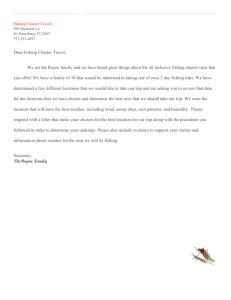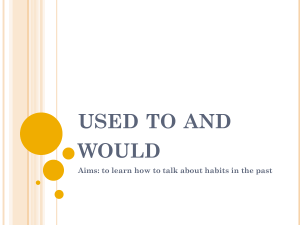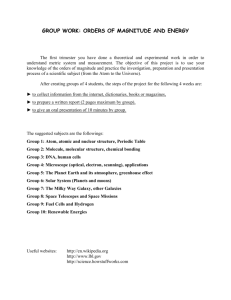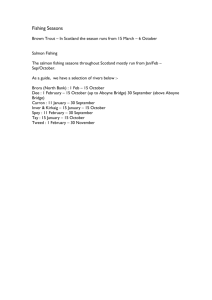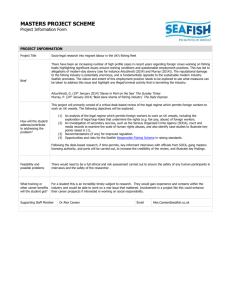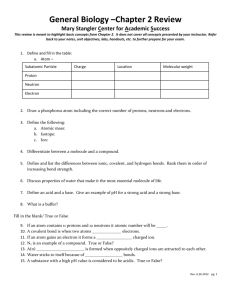Compare atoms to actions: each atom is like a building block for
advertisement
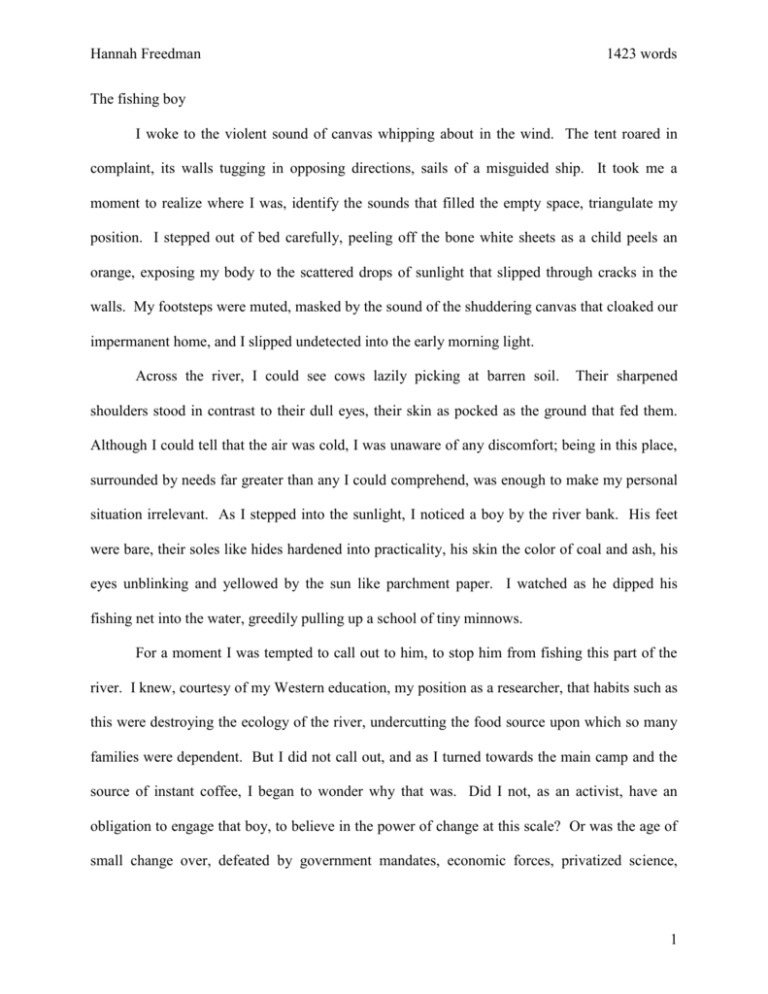
Hannah Freedman 1423 words The fishing boy I woke to the violent sound of canvas whipping about in the wind. The tent roared in complaint, its walls tugging in opposing directions, sails of a misguided ship. It took me a moment to realize where I was, identify the sounds that filled the empty space, triangulate my position. I stepped out of bed carefully, peeling off the bone white sheets as a child peels an orange, exposing my body to the scattered drops of sunlight that slipped through cracks in the walls. My footsteps were muted, masked by the sound of the shuddering canvas that cloaked our impermanent home, and I slipped undetected into the early morning light. Across the river, I could see cows lazily picking at barren soil. Their sharpened shoulders stood in contrast to their dull eyes, their skin as pocked as the ground that fed them. Although I could tell that the air was cold, I was unaware of any discomfort; being in this place, surrounded by needs far greater than any I could comprehend, was enough to make my personal situation irrelevant. As I stepped into the sunlight, I noticed a boy by the river bank. His feet were bare, their soles like hides hardened into practicality, his skin the color of coal and ash, his eyes unblinking and yellowed by the sun like parchment paper. I watched as he dipped his fishing net into the water, greedily pulling up a school of tiny minnows. For a moment I was tempted to call out to him, to stop him from fishing this part of the river. I knew, courtesy of my Western education, my position as a researcher, that habits such as this were destroying the ecology of the river, undercutting the food source upon which so many families were dependent. But I did not call out, and as I turned towards the main camp and the source of instant coffee, I began to wonder why that was. Did I not, as an activist, have an obligation to engage that boy, to believe in the power of change at this scale? Or was the age of small change over, defeated by government mandates, economic forces, privatized science, 1 Hannah Freedman 1423 words disillusioned youth, misdirected rage? Would it matter at all for the life of that boy if I tried to stop him from fishing minnows? Yes, I decided, change at this scale matters, much as a single ant matters to its colony, or a single hair matters to a coat. Or perhaps it is best to think of action like atoms. Alone, an atom is nothing more than an irreducible, imperceptible speck of durability. Without context, with no backdrop of substance, an atom is meaningless. In fact, the importance of atoms is fundamentally related to their abundance, to their interactions, to their ability to create something out of a void. At the scale of the creature, of life, of breath, the atom disappears, but without the atoms, the creature never was. And this is the importance of actions, which inspire and stick and influence, and without the actions, the revolution never was. I was dissatisfied with this answer as I watched my foot nudge a rock, revealing a damp patch of earthy life, insects squirming to escape the unfamiliar. Somehow, in spite of my conviction that small scale changes are essential, I could not justify an intervention on the fishing boy. After all, even if I had influenced the child, and he his family, and his family their village, and the practice of unsustainable fishing ended along this portion of the river, it seemed inevitable that the river would one day run barren, its lifeblood sucked dry by overharvesting and pollution and human settlement upstream. The river system itself, and all the creatures whose life sprang from it, were one minute piece in a matrix of existence. The answer to my question of change lay somewhere else. I could still hear the howl of the wind, the clatter of cow bells in the distance, as I reached main camp. I struck a match, watched the sulfur sputter to life, coaxed a flame into being, and lit the stove, leaving a kettle to boil while I turned back to my dilemma. Perhaps the answer lay somewhere far vaster, in the powers of large-scale organization, international intervention, with 2 Hannah Freedman 1423 words the influence of resources, the luxury of education, the power of reason. Perhaps the answer was visible only at a much loftier scale, where action had a spark and an impetus and a guiding light. Yes, I decided, change at this scale matters, much as the concrete matters to the building, or the sap matters to the tree, or gravity matters to the atom. Gravity is what gives the atom its meaning, for it is gravity that binds the atom to its neighbor, and its neighbor again, and which allows life to spring from a mere pile of matter. At the scale of the atom, the molecule, the element, the force of gravity disappears behind its vastness, but without gravity, the atom never was. And this is the importance of large scale organization, which gives meaning and structure and shape, and without the organization, the action never was. A leaf dislodged from a tree branch and fluttered towards the ground, the wind twirling it in loose circles like an invisible dance partner. I could still see the boy fishing in the river, the distance distorting his features, smearing together his eyes and nose and mouth. What could this possibly mean for him, I wondered. Would his life change if international organizations prioritized problems that influence his life, but of which he is largely ignorant? Would his fishing river be restored by actions taken at a scale vaster than he could envision? Would international mobilization against issues like climate change and biodiversity loss improve his life in any real way? His life, and the life of his river system, were beyond the scope of international organization, out of the reach of influence from the educated West. Again, this answer was not satisfactory, and I was grateful for the interruption when the kettle burst into an aluminum shriek from the kitchen. As I stirred my cup of Nescafe with a stick dislodged from a nearby tree, the fishing boy picked up his net and bucket and his figure melted into the bush, our parallel morning routines drawing to a close as the sun forced its way over the horizon. The answer to my question of 3 Hannah Freedman 1423 words implementing effective change would have to incorporate us both, would have to integrate our two worlds, the necessity and the reason, the small and the large. The answer to the most challenging questions that face our world—climate change, resource driven wars, mass extinction, overpopulation—lies in scale. Small changes are not sufficient, but large scale action alone has no context. The solution, thus, requires some blend of strategies, some interaction between the small and the large, the instantaneous and the infinite. This pliant balance of life at all spatial and temporal scales is akin to the system of regulation in a savanna ecosystem. While herbivores and fire control the system from the top downward, soil nutrients and rainfall patterns exert pressure from the bottom up. From the scale of the tannin to that of the elephant, over the life of a mayfly and over that of a baobab tree, the system is coordinated, a creature all its own, bound together by the give and take of forces at all levels of existence. If we expect to create measurable change in the coming decades, we will have to follow the model of interaction provided by the natural world. We must recognize that the problems we now face are problems of scale, in that they require integrated solutions, with pressure from both local forces and individual actors as well as pressure from national and international organizations. While eating organic or bicycling to work alone will not create global change, small actions such as these give context and meaning to the climate talks in Copenhagen and conservation projects like the Big Cat Initiative. Thus, the only way to effectively change the world is through the integration of local and international. Personal level commitments must be inextricably bound to global commitments, much as the structure of the atom is bound to the structure of the world. From this perspective, the fishing boy and the climate talks are not just important, but bound together in a complex but irreducible chain of existence. 4


